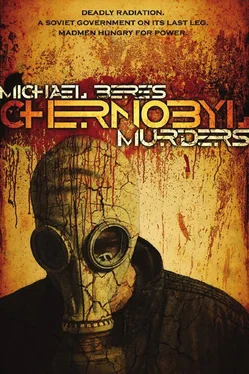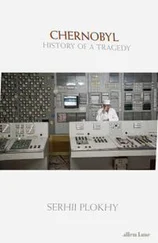Michael Beres - Chernobyl Murders
Здесь есть возможность читать онлайн «Michael Beres - Chernobyl Murders» весь текст электронной книги совершенно бесплатно (целиком полную версию без сокращений). В некоторых случаях можно слушать аудио, скачать через торрент в формате fb2 и присутствует краткое содержание. Жанр: Триллер, на английском языке. Описание произведения, (предисловие) а так же отзывы посетителей доступны на портале библиотеки ЛибКат.
- Название:Chernobyl Murders
- Автор:
- Жанр:
- Год:неизвестен
- ISBN:нет данных
- Рейтинг книги:4 / 5. Голосов: 1
-
Избранное:Добавить в избранное
- Отзывы:
-
Ваша оценка:
- 80
- 1
- 2
- 3
- 4
- 5
Chernobyl Murders: краткое содержание, описание и аннотация
Предлагаем к чтению аннотацию, описание, краткое содержание или предисловие (зависит от того, что написал сам автор книги «Chernobyl Murders»). Если вы не нашли необходимую информацию о книге — напишите в комментариях, мы постараемся отыскать её.
Chernobyl Murders — читать онлайн бесплатно полную книгу (весь текст) целиком
Ниже представлен текст книги, разбитый по страницам. Система сохранения места последней прочитанной страницы, позволяет с удобством читать онлайн бесплатно книгу «Chernobyl Murders», без необходимости каждый раз заново искать на чём Вы остановились. Поставьте закладку, и сможете в любой момент перейти на страницу, на которой закончили чтение.
Интервал:
Закладка:
Before getting into the van, the inquisitive German man questions Lyudmilla. “The Belarus border is how far from here?”
“Fifteen kilometers,” answers Lyudmilla.
The German climbs into the van but keeps talking. “It was the Bel-o-russian Republic back then. They received the worst of the radiation because of the winds. Perhaps it is part of the reason they changed the name to Belarus. There is confusion regarding the spelling. Some say they are Bel-a-russians with a letter A, while others retain the old spelling with an O. And sometimes, like in your brochure for the tour, they can’t make up their minds how many S’s are in the word. It makes one wonder whether the radiation is still having an effect, knocking letters about in the name of the people to the north.”
The German chuckles at his cleverness, but no one else seems amused.
After everyone is back in the van and it drives down the road where weeds emerge from cracks in the pavement, the crane at the sarcophagus starts up again. A new shift of workers has returned to their duty, attempting to permanently entomb the Chernobyl mistakes of the past.
Back in Pripyat all is silent. The sun is out, the dust has settled, and the ghosts of the past assemble. Inside a kindergarten, a tattered poster shows children doing exercises. Inside the lobby of an abandoned movie theater, banners prepared for the 1986 May Day celebration lie scattered on the floor. One of the banners is stretched across the floor. Its faded red has Russian lettering saying, “The Party of Lenin Will Lead Us to the Triumph of Communism.”
Out on the overgrown boulevard, streetlights, which will never light again, resemble skinny guards with crooked necks. A hotel of several stories has a sign with raised letters on its roof. Several letters are teetering, but it can still be read. “Hotel Polissia.” An overturned child’s tricycle in an overgrown school playground has a small tree growing up through its spokes.
In front of one apartment building, a pair of wolves walks along the street. One wolf turns up an overgrown walkway and heads for the open doorway to the building. The wolf stares inside, then, as if knowing the danger, turns quickly to catch up to its companion, and the two trot off into the late-afternoon sun and head for the pine forest in the distance.
Inside the building, the doors to the elevator in the lobby have been pried off and lie on the floor. A bird flies in the front door and up the elevator shaft. In a hallway on an upper floor of the building, someone has chiseled, “Good-bye forever,” in Ukrainian, in Russian, and in English on the plaster wall. Inside an apartment, tattered family photographs barely hang onto a wall from which plaster has peeled away. Other photographs lie on the floor, half-covered with debris.
Outside the window of the apartment is a view of Pripyat with its many buildings and streets and ghosts. In the distance, along a main boulevard, the two wolves have captured a small animal in the weeds and take turns tearing it apart. Farther away beyond the pine forest, but not far enough, the weathered towers of the Chernobyl Nuclear Power Plant (once known as the V. I. Lenin Nuclear Power Station) are clearly visible.
Because of the setting sun, the old sarcophagus with its new construction blends into the earth, making the mound that was once reactor number four small and meaningless, like the raised soil of a grave. But suddenly, as the sun settles into the horizon, nature performs one of her tricks, turning the necklace of new construction into a crimson choke chain. Two decades earlier, when the chains of Marxist-Leninist social order hung by a thread, little was known of the terror and violence generated by vindictive men behind the veil of disaster.
2
August 1985
Far Western Frontier, Ukraine Republic, USSR
Detective Lazlo Horvath, known as the Gypsy by his Kiev militia comrades, sat on a wooden bench in a hole in the ground. Above his head, at the top of the shaft, a wooden trapdoor held up with a stick partially blocked daylight. It was cool in the hole, so much cooler than in the relentless sun aboveground.
Lazlo took a deep breath, nostrils tingling from dampness and the smell of wine-soaked wood. The absence of his shoulder holster and his Makarov 9mm pistol was noticeable. He felt unconstrained and at peace, a bear gone into hibernation in summer instead of winter. The sweet, cool air made breathing easier, and he wondered if inhaling it could recapture his youth. Unlike Kiev’s polluted air, this was country air, the air of the plateau adjoining the northern Carpathian range where he was born and raised. Compared to the congestion in Kiev five hundred kilometers to the east, the plateau was paradise. Breathing cool underground air by day and sleeping beneath the stars by night made life as a detective in Kiev a bizarre fantasy, an old silent film in which everyone runs about bumping into one another.
Lazlo closed his eyes, imagined the plateau’s altitude super-imposed upon Kiev’s valley, imagined himself floating a hundred meters above the city. Detective Lazlo Horvath on a flying carpet, which suddenly shifts sideways, veering dangerously close to the statue of Saint Vladimir. Lazlo performs a gymkhana move to avoid being poked in the ass by Saint Vladimir’s bronze crucifix.
Saint Vladimir, who performed baptisms in the Dnieper River, is getting even with the Gypsy for his years away from church.
When Lazlo opened his eyes and laughed aloud, earthen walls reinforced with decaying timber absorbed the sound, making the laugh resemble a series of belches from too much Russian beer.
But he was not light-headed from beer. Red wine had been today’s drink. And this was no ordinary hole in the ground. This hole was the wine cellar in the yard of the family farm. It had been dug into the plateau decades earlier. He was far away from Kiev on the Ulyanov collective near the village of Kisbor twenty-five kilometers from the Czech border. He and his brother and his brother’s family were spending their August holiday with Cousin Bela, who now ran the farm in this Hungarian-speaking district that, before the war, had been part of Czechoslovakia. Yesterday had been a family reunion of sorts when U.S. Cousin Andrew Zukor and his wife visited. A brief visit because of the Soviet security proviso insisting all foreigners return before nightfall to the Intourest hotel in Uzhgorod.
After awakening from the momentary dream and realizing where he was, Lazlo recalled his bloodcurdling fear of the wine cellar when he was a boy. He had been five or six when his father first sent him into the cellar for dinner wine. At the time he was certain the dead from the nearby cemetery would tunnel in and get him. So long ago when his mother and father were alive. Now they rested in the cemetery, and he wondered if they were aware of him, their detective son unearthing childhood terrors. And in another cemetery on the other side of the mountains, someone else might be aware of him down here. The deserter who gave up the name Gypsy when Lazlo’s trembling finger pressed the trigger of his rifle many years before he ever thought of joining the militia.
To drive the adversity of his youthful army years from his mind, Lazlo envisioned his small corner cubicle at Kiev Militia Headquarters. He wears his old, worn shoulder holster and his scratched Makarov. Down the narrow walkway between cubicles, Chief Investigator Chkalov sits in his office. Chkalov’s fat face smiles as he piles on yet another case because of the Gypsy’s bachelor status.
Which was worse? Rehashing a terrible past episode from the army, or anticipating his future return to duties in Kiev? The wooden ladder at the entrance to the wine cellar answered his question by giving off a loud creak. It was better to live in the present. He looked up to see bare legs and feet encased in red canvas sneakers descending the ladder. The legs coming down were those of his younger brother, Mihaly, who had, a few minutes earlier, left the hole to relieve himself.
Читать дальшеИнтервал:
Закладка:
Похожие книги на «Chernobyl Murders»
Представляем Вашему вниманию похожие книги на «Chernobyl Murders» списком для выбора. Мы отобрали схожую по названию и смыслу литературу в надежде предоставить читателям больше вариантов отыскать новые, интересные, ещё непрочитанные произведения.
Обсуждение, отзывы о книге «Chernobyl Murders» и просто собственные мнения читателей. Оставьте ваши комментарии, напишите, что Вы думаете о произведении, его смысле или главных героях. Укажите что конкретно понравилось, а что нет, и почему Вы так считаете.












